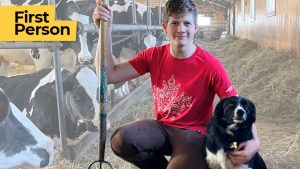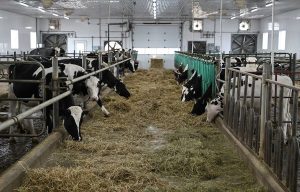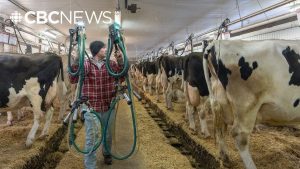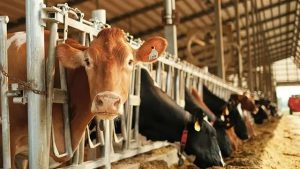
Crosbie Williams and his family have been putting milk on the table at homes across Newfoundland and Labrador for over six decades, but he says the rising cost of doing business is painting an uncertain picture for the future.
Williams, a fourth-generation dairy farmer in the Goulds neighbourhood of St. John’s, houses 250 cows across 325 acres of land at Pondview Farms. He said the COVID-19 pandemic and the Russian invasion of Ukraine created the perfect storm to send operational costs through the roof.
“Feed additives are up 50 per cent … fertilizer’s up 85 per cent, everybody knows about fuel,” Williams told CBC News on Wednesday.
“I guess the most troublesome input cost that we have is feed, and that’s up by 35 per cent. That happened just over a week ago. These costs are really making it difficult to remain viable in the dairy industry.”
Williams isn’t the only one feeling the pinch of rising costs. He says he and other farmers have been trying to find ways to be more cost-efficient, but things aren’t looking bright in the short term.
“It’s getting to a scary time. And I’m not going to sugarcoat that. When you get up in the morning and not know if bills can be paid, to me that’s frightening,” he said.
“To be quite blunt … we’re going to lose our farms,” Williams added. “Food security has always been top of mind for people in our province for the last 50 years. And to be honest with you, we’re in jeopardy of losing that.”
PC MHA Pleaman Forsey said he’s heard similar concerns from farmers across the province and is calling on the provincial government to find a financial solution to make sure farms can continue operating.
Williams says that support could come in the form of a price break in diesel for farmers, as the rising price of fuel is making costs add up quickly.
Increasing how often the price of milk is set could also be beneficial, he said, as it is usually done only once a year by the Canadian Dairy Commission.
Fisheries, Forestry and Agriculture Minister Derrick Bragg said in the House of Assembly on Wednesday that there are over $10 million in grants available to farmers and he hopes to see what more can be done to help in the industry ahead of meetings this summer.
“We need help for our farmers now. There’s no doubt there’s a real concern in that industry and in most industries right now,” Bragg said.
Bragg says he doesn’t expect the supply chain for milk to be affected in the short term.

























